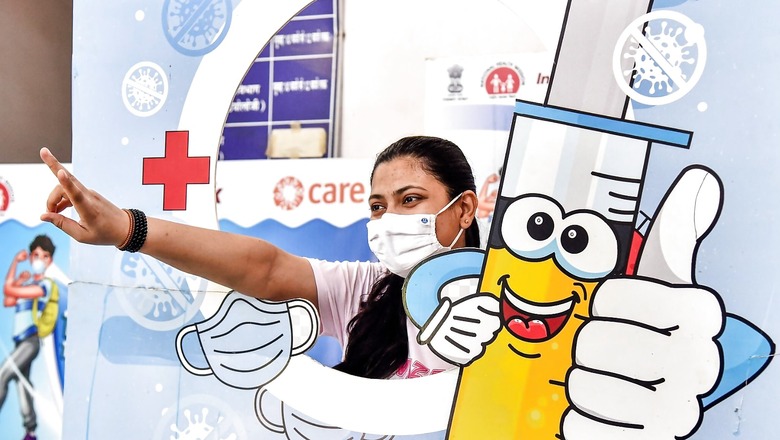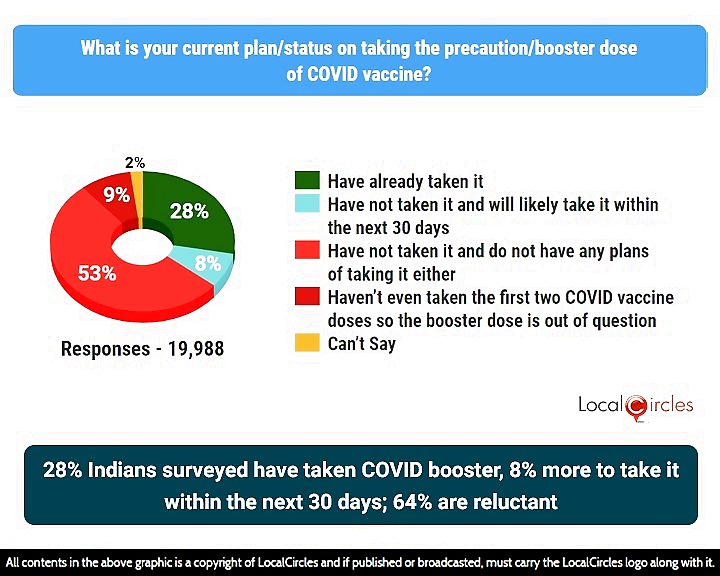
views
Amid government’s reminders for vaccine boosters in the wake of the Covid uptick in China, 28% of those surveyed by Localcircles said that they “have already taken the booster dose". However, 53% said that they “have not taken the booster dose and do not have any plans of taking it either".
Here’s why you should not be like the 53% surveyed citizens.
When it comes to getting vaccinated against a disease like Covid-19, booster shots can be a standard part of the procedure. The term “booster" refers to an additional dose of a vaccine given after the initial (or primary) dose. Booster shots are given to the body’s immune system to remind it of the virus it needs to defend against. This strengthens or boosts the immune system. Covid boosters are also said to be extremely helpful for risk groups – the elderly or those with immunity compromising diseases. After the Centre’s meeting on Wednesday, Niti Aayog’s VK Paul informed that only 27-28% of India’s population had received the booster dose to date.
Localcircles survey received 19,988 responses from citizens located in 309 districts of India — 66% respondents were men, while 34% respondents were women. While 43% respondents were from tier 1, 33% from tier 2 and 24% respondents were from tier 3, 4 and rural districts.
THE SURVEY
When asked by Localcircles about the current plan or status on the precaution/ booster dose of Covid vaccine, 9% of the respondents said they “haven’t even taken the first two Covid vaccine doses so the booster dose is out of question"; and 8% shared that though “have not taken it" they will “likely take it within the next 30 days". Only 2% of the respondents revealed that they were undecided on this issue.

An assessment of the feedback shows that many, especially in tier 2, 3 and 4 and rural districts, believe Covid has long gone and there is no need to take any more doses. Also, a spate of cases of heart attacks and brain strokes that have occurred in people’s own networks and those reported in the media are leading a section of the population to believe that the vaccine is causing side effects.
In a LocalCircles study, 51% citizens said that they have one or more individuals in their close network who has had a heart or brain stroke, cancer acceleration or a neurological condition in the past two years. The number stood at 31% a year ago in December 2021. There is no comprehensive medical research available that the vaccines deployed in India (Covishield and Covaxin mostly) are causing adverse events.
THE CHINA STORY
According to multiple news reports, the omicron subvariant BF.7 is to blame for the Covid breakout in China.
The omicron variant of Covid-19 has evolved into several subvariants since its appearance in 2021. A report by Live Science states that BF.7 is an abbreviation for BA.5.2.1.7, a sub-lineage of the omicron variant BA.5. BF.7 is said to be the most infectious of the omicron subvariants, including BA.1 and BA.2. According to Li Tongzeng, a medical expert at Beijing’s Xiaotangshan Hospital, it also has a higher immune escape capability. Immune escape is the inability of the host’s immune system to respond to an infectious agent.
China was relying on the Zero Covid approach all this while to deal with the pandemic. Due to strict lockdowns, China’s death toll has remained low since the outbreak began – the official figure is now just over 5,200. This reported figure equates to three Covid deaths per million in China, compared to 3,000 in the United States and 2,400 in the United Kingdom, the BBC reported. But due to this factor, a large majority of the Chinese population was never exposed to the virus like other countries, leading to low levels of immunity – because of low levels of infection so far.
After country-wide anti government and lockdown protests in China, Xi Jinping began relaxing lockdown, putting an end to Zero Covid.
‘NO NEED TO WORRY, JUST EXERCISE CAUTION’
Union Health Minister Mansukh Mandaviya on Thursday announced that in light of Covid-19 concerns in India, 2% of all International passengers arriving in airports will be randomly tested for the virus through an RT-PCR test. According to Dr Anurag Agarwal, former Head of INSACOG and Institute of Genomics and Integrative Biology (IGIB), while there is no cause for worry for India, remaining cautious and upping the surveillance game is an obvious move.
The minister has told officials to sensitise people once again about maintaining social distancing. With focus on upcoming New Year parties and gatherings, the government will try and raise awareness about hand hygiene, following social distancing norms and wearing masks.
The minister has advised officials to start promoting booster shots, especially for those with co-morbidities and compromised immunity. In terms of surveillance, samples will be pulled out and tested from sewage water, incoming travellers at airports and usual samples taken by Indian laboratories for Covid-19 testing. These will be randomly sent for genome sequencing, which will help in upping surveillance to detect the strains circulating in the country.
Apart from detecting new strains, the government has asked officials to test the efficacy of vaccines used in India — majorly Covishield and Covaxin — against the new strains in question.
Meanwhile, the ministry has approved Bharat Biotech’s intranasal Covid vaccine as a booster.
The India-made vaccine will be included in the vaccination programme as a booster dose for those above 18 years of age and will be introduced on the Co-WIN platform on Friday evening.
Read all the Latest India News here

















Comments
0 comment